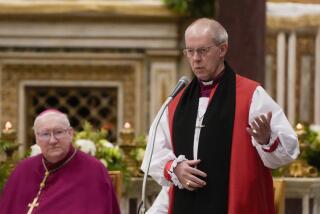Tutu Gives S. Africa Apartheid Deadline : Start Dismantling or He’ll Urge Economic Sanctions, Bishop Says
- Share via
JOHANNESBURG, South Africa — Bishop Desmond Tutu, the 1984 Nobel Peace laureate, said Sunday that if the white-minority regime here does not begin “actively dismantling” its system of racial separation within the next two years, he will urge the West to impose “punitive economic sanctions” on South Africa, including the withdrawal of foreign investments.
Speaking at his installation as the Anglican bishop of Johannesburg, Tutu, 53, said that at present he favors increased foreign investment in South Africa if it is linked to improvements in black employees’ working and living conditions and to political reforms benefiting all the country’s 24 million blacks.
However, he urged greater international political, diplomatic and economic pressure on the Pretoria government to push it toward negotiations with the black majority on the country’s future.
In effect, Tutu was challenging President Pieter W. Botha to fulfill the promises he has made in the last two weeks--of sweeping political, economic and social reforms--and serving notice that, in his new church post, he expects to remain a leader in the struggle by South Africa’s blacks against apartheid.
He listed these criteria for progress: an end to the forced resettlement of blacks, abolition of regulations restricting them from working in urban areas and living there with their families, recognition of blacks as full South African citizens, strengthening of black labor unions and the rapid improvement of education and vocational training for blacks.
Tutu had said last week that without concrete progress, the government’s reform proposals would be “grossly insufficient” because they are not based on talks with black leaders and do not fully reflect the aspirations of blacks.
‘Authentic Leaders’
The prelate went on Sunday to urge the government to free the jailed leaders of the African National Congress, the oldest anti-apartheid group, and to grant all political prisoners and exiles full amnesty so that negotiations can be held with the black community’s “authentic leaders.” Tutu again offered to act as an intermediary between the African National Congress and the government.
Last week, Botha offered to free Nelson Mandela, imprisoned since 1962, as well as other black leaders who are willing to declare their commitment to nonviolence in the struggle against apartheid.
Although Mandela and other jailed leaders have not responded directly to the offer, black political activists here argue that the African National Congress cannot give up guerrilla warfare, terror attacks and sabotage without obtaining matching concessions from the government, starting with the organization’s legalization and, at the least, “talks about talks.”
In his Sunday address, Tutu said, “I give notice that if, in 18 to 24 months from today, apartheid has not been dismantled or is not being actively dismantled, then for the first time I myself will call for punitive economic sanctions.”
Although he did not refer directly to Botha’s recent reform proposals, Tutu made it clear that he will judge the government’s sincerity by its actions, not its promises.
Tutu, the controversial secretary general of the South African Council of Churches for almost seven years, acknowledged that his appointment as the Anglican bishop of Johannesburg, the first black to hold that prestigious post, has provoked criticism from some white Anglicans, who have threatened to end their financial support or, in a few cases, even to leave the church.
As head of the Anglican diocese, Tutu said, he will work to more fully integrate the church so that there will no longer be white parishes and black parishes and so that white priests and black priests can serve anywhere.
More to Read
Sign up for Essential California
The most important California stories and recommendations in your inbox every morning.
You may occasionally receive promotional content from the Los Angeles Times.













